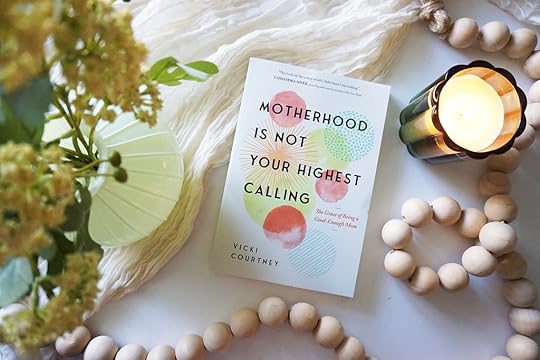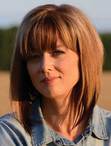When You Wonder If Motherhood Is All You Are
One afternoon, she pulled a well-worn Christian parenting book off her bookshelf and, almost absentmindedly, began scanning the introduction. It didn’t take long before her eyes landed on a phrase so familiar from her young motherhood days: “Motherhood is a high calling. Perhaps the highest calling God can give a woman.” The words made her wince. She muttered under her breath, frustrated at the weighty and unrealistic expectations that had been laid upon mothers of her generation. Then came the shock—this wasn’t just any book. It was a book she herself had written years ago. In that moment, award winning author Vicki Courtney realized with a pang of honesty: she had once been part of the problem. In this excerpt from Motherhood Is Not Your Highest Calling, she invites us back into God’s Word to uncover a deeper and freer truth about our identity in Christ. It’s a joy to welcome Vicki to the farm’s table today…
Guest Post by Vicki Courtney
I recall a Sunday years ago at my previous church, where the service specifically addressed the topic of “biblical womanhood” and “biblical manhood.”
The men and the women were placed in separate groups and taught a lesson that had been prepared by a male pastor on staff. I was out of town on that Sunday, but in the aftermath, multiple women reached out to me because they had found the lesson troubling.
One of the women sent me the outline, and upon reading it, I could certainly understand the concern.
The lesson stated that a woman’s ultimate life purpose was to “help men’s worthy leadership with submission and respect and prioritize the nurturing and raising of children.”
A woman in the class lodged a formal complaint to the staff that the teaching suggested a woman’s value is directly dependent on her role as a wife and mother. She argued, “I am complete in my relationship with God, with or without a man or children.”
She went on to share that she had served many years as a missionary prior to meeting her husband and that once married, she struggled to have children. She and her husband were in the process of adopting a child, and the lesson left her feeling as though she was “less than” or out of God’s favor.








Other women took offense that the responsibility of “nurturing and raising of children” was laid solely on their shoulders. Many worked full-time jobs to help pay the bills, some even outearning their husbands or working longer hours to make ends meet.
Worst of all was the fact that this brand of “womanhood” was (and often still is) presented as “biblical,” suggesting that women who don’t follow the template and fulfill their so-called purpose (marrying and having children) are disobedient and outside God’s will for their lives.
I thought about how hurtful this teaching is to so many women in the family of God.
Single women who dream of marriage and motherhood but aren’t sure that dream will ever become reality. Or married women who long to be mothers but struggle with infertility. Or women who simply don’t feel called to have children.
How invisible they must have all felt in a church culture telling them that marriage was what every woman was destined for, and that children were a mandatory by-product of marriage.
I felt a wave of compassion for all the women who had been exposed to this toxic teaching and were left wondering if they were less loved by God, or who were questioned and challenged over the years about being single or childless or working outside the home. This hardly sounds “biblical.”
That lesson became a turning point for me. I began to rethink many of the “biblical womanhood” teachings I had accepted without question over the years and sadly even recycled into some of my early books and Bible studies. Fortunately, those books are now out of print, but it grieves my heart all the same to know I may have added to the confusion and pain many Christian women experience in unpacking their identity.
I began to dig deeper into the Scriptures about the roles of women in the church and home and could find nothing that supported the assertion that a woman’s primary purpose is linked to marriage and motherhood or that being a mother is a woman’s highest calling.
Given the amount of attention the topic has generated over the years, you would expect there to be a score of Scriptures supporting the oft-taught conclusions that a woman’s ultimate purpose is to be a helpmeet to her husband and bear children. The lack of Scriptures that speak to women’s roles, let alone parenting, is truly astounding.
What I further realized is that, if I’m going to be wise and responsible in discerning the meaning of different passages of Scripture, I needed to consider the few that speak to women’s roles within the larger context of the patriarchal times in which they were written.
Over the years various Bible theologians have studied these passages without agreeing on their meaning, but context gave me clues that my original understanding of biblical womanhood was far too limited. One much-touted example was the Proverbs 31 woman (aka “a virtuous woman” or “a wife of noble character”), who has been propped up as the ultimate biblical role model for Christian women because of her domesticity and her devotion to her husband and children.
But what we can too easily miss is how extraordinary this woman was beyond marriage and motherhood.
When was the last time you heard someone highlight the fact that she ran a business selling linen garments (verse 24) and ensured her trading was profitable (verse 18)?
Or that she dabbled in real estate and used the earnings to plant a vineyard (verse 16)?
Or, that she prioritized caring for those in need in addition to caring for her family (verse 20)?
Or that she had servant girls to help her on the home front (verse 15)?
And never mind that she wasn’t even an actual woman who existed, but rather a list of idealized attributes in the form of an acrostic poem that was thought to be recited by pious Jews of the day!









My point is, many of the positions we’ve been taught related to the roles of women often rely on isolated Bible verses taken out of the context of the whole of Scripture or the time they were written (and the cultural norms of the day).
And when we do, we create burdens for ourselves and others that God never intended us to carry.
One of my greatest joys in life has been being a mother.
While I consider it an important calling, it is not my highest calling.
Nor is it yours.
And that should come as a great relief
Our ultimate value…is found in who we are in Jesus Christ.
Our identity as being a child of God comes first and foremost.

Vicki Courtney is a national speaker to women of all ages and the best-selling author of numerous books and Bible studies including, Move On, Rest Assured, 5 Conversations You Must Have With Your Daughter, and 5 Conversations You Must Have With Your Son. She is a two-time ECPA Christian Book Award winner and has appeared on CNN and Fox News as a youth culture commentator. Vicki and her husband, Keith, reside in the Texas hill country and are the proud parents of three grown children and ten grandchildren.
In her newest book Motherhood is Not Your Highest Calling, Vicki addresses the unattainable expectations that often burden mothers and redirects the focus to God’s grace which covers our shortcomings.
Vicki seeks to remind her readers that our identities are not found in motherhood, but in God alone and who we are in Him.
{Our humble thanks to NavPress for their partnership in today’s devotional.}
Ann Voskamp's Blog
- Ann Voskamp's profile
- 1368 followers



